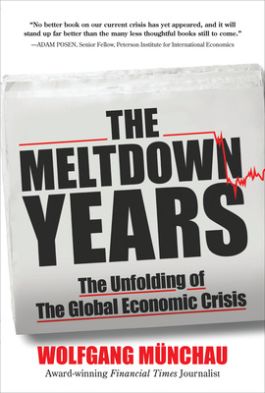The Meltdown Years: The Unfolding of the Global Economic Crisis
2. The Credit Market - A Modern Weapon of Mass Destruction
3. Economic Policy
4. What Happens Next
5. What To Do Now
6. Caveat Emptor - Or What the Crisis Means for Private Investors
Epilogue: When the Crisis is Over
Appendix: A Few Lessons from History
Glossary and List of Abbreviations
Recommended Literature
Remarks
The Meltdown Yearsoffers the most lucid and useful explanation todate about why home values, life savings, jobsecurity, and investments around the worldare in peril.
Rather than focus on who is to blame,though, author Wolfgang Münchau takes themore practical approach of focusing on what isto blame. The fact that individuals were stupid,greedy, and corrupt should come as no surprise.What’s remarkable is that our world’sfinancial systems—put in place to help staveoff such a crisis—failed so miserably.
What is inherently wrong with the globalmonetary system? What happened to theregulatory process? What role did the creditmarket, hedge funds, and investment banksplay? These are the types of questions onemust answer in order to truly comprehendwhat caused the meltdown and, more importantly,to understand what must be done torepair it.
Münchau dissects the global financial system,exposing its flaws and weaknesses in thecontext of the crisis. A decidedly global perspectiveof the greatest financial crisis of ourtime, The Meltdown Years examines
- The structure of the worldbanking system
- Global events that led tofinancial collapse
- The growth of speculative bubbles
- The descent from financial crisisinto full-out recession
Pointing to an unstable global economicsystem as the root of the problem, theauthor predicts how long the recession willand illustrates long-term consequences ofthe meltdown.
“Apportioning [individual] blame for thiscrisis may be fun,” Münchau writes, “butit is a dead-end road for anyone who seeksan understanding of what happened.” AIG,Alan Greenspan, Fannie Mae, Bear Stearns…Each is portrayed as a villain responsible forthe state of the economy. In truth, the blame ismuch broader and lies much deeper.
The Meltdown Years is required readingfor anyone who wants to follow the ongoingdebate about economic recovery and understandwhat the collapse means for the future offinancial capitalism.

